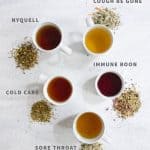5 Cold-Busting Herbal Tea Blends
When the scratchy throats and runny noses hit your house, break out these five herbal tea blends to get yourself feeling better in a jiffy.
Cost: low
Equipment
- Tea strainer
Materials
For Immune Boon Herbal Tea
- 1 part dried echinacea leaves and flowers if available, if not, just leaves is fine
- 1 part dried rose hips
- 1 part dried elderberries
- 1 part dried astragalus
- 1 part dried ginger root
For Sore Throat Antidote Herbal Tea
For Cold Care Herbal Tea
For NyQuell Herbal Tea
For Cough Be Gone Herbal Tea
- 1 part dried marshmallow root
- 1 part dried wild cherry inner bark
- dried thyme
- 1 part dried red clover leaf and flower
Instructions
For All Teas
- Combine all ingredients a large bowl. Store in a labeled airtight jar or container out of direct sunlight.
- To brew: combine 1 tablespoon of tea with 8 ounces of boiling water. Cover and let steep for 30-45 minutes. Strain, sweeten to taste with honey, and serve.
Notes
- Echinacea only gives you a short burst of immune boosting, so drink this only for the first 1-2 days of an illness.
- Because echinacea is a white blood cell count booster, it should not be taken by those suffering from leukemia.
- An allergic reaction to echinacea is rare, but it happens—if you get itchy eyes or other signs of allergy, discontinue use.
- Those with an autoimmune condition should speak with their health care provider before consuming immune-boosting herbs (in particular echinacea and astragalus). In general, it’s a good idea to speak with a health care professional before starting any new herb.
- Astragalus may reduce the effects of immunosuppressive drugs (such as those taken after organ transplant, during cancer treatment, or to treat extreme autoimmune diseases). Astragalus should also be avoided by those taking lithium.
- For some, licorice root can be a mild stimulant—which might not be entirely bad if you’re under-the-weather and need to get through the work day. If after drinking this tea, you feel wired, just reduce the amount of licorice root.
- Licorice root is 50 times sweeter than table sugar, so taste before sweetening! If this blend is too sweet for you, reduce the licorice by half.
- Sage can reduce a breastfeeding mother’s milk flow significantly, so use with caution while breastfeeding.
- It’s recommended to keep sage dosing to less than 15 grams of dried sage leaf per day.
- Licorice contains glycyrrhizic acid, which in large amounts can cause sodium retention and potassium loss, which can cause stress to the heart and kidneys. If you have a history of high blood pressure, heart issues, or kidney issues, only use licorice under the guidance of your health care professional.
- Yarrow in large doses during pregnancy is not recommended due to its stimulating properties in the uterus. If you’re pregnant, leave the yarrow out of this tea.
- Some people with ragweed allergies report allergic reactions to yarrow. I personally have wicked sinus allergies to ragweed and have never had a problem with yarrow, but if using yarrow gives you itchy eyes, a rash, or other allergic symptoms, discontinue use.
- Valerian works as an excellent sedative in the vast majority of people, but for a small amount of folks (about 10% of the population), valerian actually metabolizes differently and is stimulative. If after drinking this tea you feel more wired than tired, valerian root might not be for you!
- Some people have allergies to chamomile. If you get itchy eyes, a rash, or other allergic symptoms, discontinue use.
- A long infusion of chamomile tastes bitter and valerian root isn’t wonderful tasting, so the NyQuell isn’t the most pleasant tasting tea on the block, but it sure does work!
- Red clover has blood-thinning properties and should not be used by those who are on blood thinners, have blood clotting issues, or who will be undergoing surgery in the near future.
- Wild cherry bark does contain cyanide compounds in very small amounts. Do not consume large amounts of wild cherry bark for long periods of time. Also, never use the leaves of wild cherry trees, only the inner bark.
- For the most medicinal benefits: brew at least 1 quart at a time, and then drink ¼ cup to ½ cup of hot tea every hour. Discontinue drinking at least an hour before bedtime so you don’t have to hit the restroom in the middle of the night.
